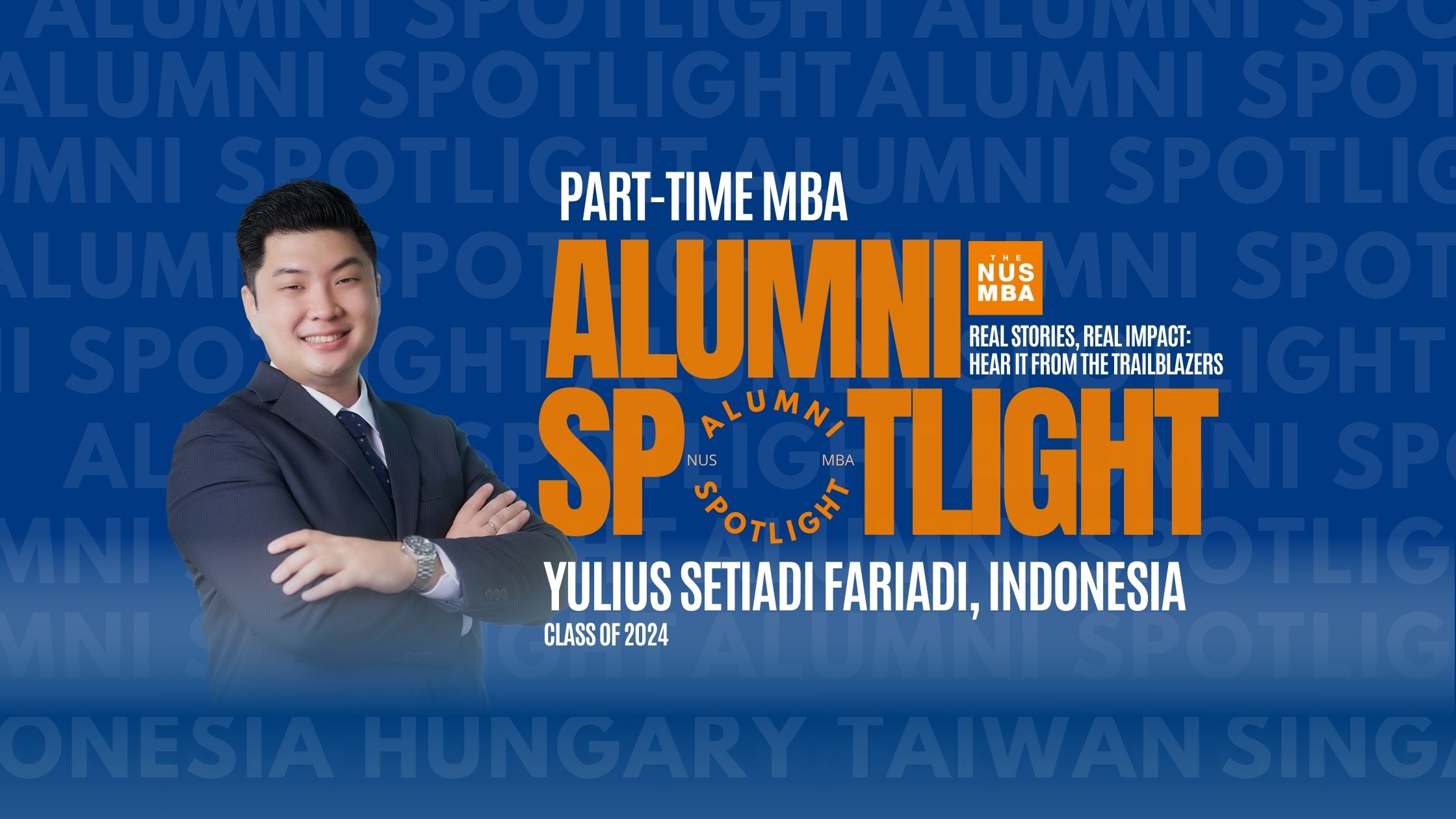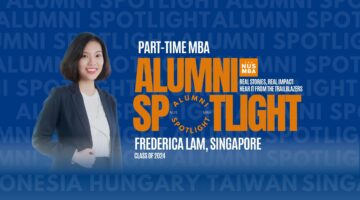Yulius Setiadi Fariadi on Career Growth, Leadership, and Lifelong Learning
“An MBA is meant to challenge your thinking” – Yulius Setiadi Fariadi on career growth, leadership, and lifelong learning
Indonesia, Part-time MBA, Class of 2024
Current role: Branch Manager, Ops Analysis & Technology in SMRT Trains
For Yulius Setiadi Fariadi, pursuing an MBA was not solely about career advancement. He wanted to equip himself with the right tools to bridge the gap between a technical and management role. As a Branch Manager of Ops Analysis & Technology at SMRT Trains, he had spent years honing his engineering expertise, but stepping into a leadership role required a different skill set. He needed a stronger grasp of business strategy, financial management, and people leadership.
The NUS Part-time MBA provided that and more. From mastering operational strategy to learning how data analytics can drive business decisions, Yulius gained the confidence and knowledge to lead effectively. His experience extended beyond the classroom, from an exchange program in Germany that broadened his global outlook to balancing work, studies, and family life with the support of his wife and newborn son.
Reflecting on his journey, he shares: “An MBA is meant to challenge your thinking, push your boundaries, and help you develop resilience.” In this interview, Yulius talks about what inspired him to take this step, how the NUS MBA shaped his career, and why he believes lifelong learning is essential in today’s fast-changing business landscape.
What inspired you to pursue an MBA, especially during your transition from an engineering role to management?
Working in SMRT, I’ve always been driven by a strong commitment to operational excellence and continuous improvement. As I progressed in my career, I realized that transitioning from an engineering role to management required a broader skill set which goes beyond technical expertise. While my technical expertise allowed me to solve problems at a system level, stepping into management meant making strategic decisions, leading teams, and aligning operations with broader and global business objectives.
Pursuing an MBA became the logical next step to bridge this gap. I wanted to develop business strategy, financial acumen, and people management skills. Beyond that, I saw the MBA as an opportunity to learn from industry leaders, build a professional network with people from various backgrounds, gain exposure to global best practices, and develop a holistic perspective on business operations.
Public transport is an industry that is constantly evolving, driven by technology, sustainability, and customer expectations. The MBA has provided me with the strategic tools, frameworks, real-world exposures, and confidence to navigate these complexities.

Why did you choose the NUS part-time MBA program, and what aspects of the program stood out to you compared to others?
When considering an MBA, I wanted a program that would not only strengthen my leadership capabilities but also equip me with relevant, up-to-date knowledge that aligns with industry trends. As the top-ranked part-time MBA program in Singapore, NUS Business school was the clear choice, not only for its global reputation, strong faculty, solid alumni profiles, and well-structured program but also for its ability to continuously evolve its curriculum to stay ahead of the ever-changing business landscape.
One of the aspects that stood out was how NUS tailors its modules to reflect the latest industry developments. Throughout my MBA, I had the opportunity to take courses on emerging technologies such as blockchain and data analytics—both highly relevant in today’s digital transformation era. The data analytics module in particular provided a managerial perspective on leveraging data for strategic decision-making, which has been useful in my current role as Branch Manager for Ops Analysis & Technology, where data-driven insights are crucial for optimizing operations and enhancing commuter experience.
At the same time, NUS does not lose sight of the core fundamentals of an MBA through its compulsory core modules. These courses were essential in developing my ability to analyze financial statements, understand cost structures, and evaluate business decisions from a strategic perspective which are crucial as I take on greater responsibilities in management.
Beyond academics, what also sets NUS apart is its experiential learning modules. Modules such as Launch Your Transformation go beyond traditional lectures, pushing students to step outside their comfort zones and develop leadership skills through immersive experiences. This hands-on approach, combined with the part-time program’s flexibility for working professionals, made NUS the perfect fit for me as I balanced my MBA journey alongside my full-time job.
How has the NUS part-time MBA helped your transition to your managerial role? Are there specific skills or knowledge you’ve applied directly to your work?
One of the biggest takeaways from the MBA journey has been the structured frameworks for continuous improvements, which directly resonate with SMRT’s strong Kaizen culture. The ability to analyze processes, identify inefficiencies, and implement structured improvements is crucial in my role, and the MBA provided me with both the theoretical knowledge and practical applications to do so.
Modules covering value chain mapping, Kaizen methodologies, and operational strategy were particularly relevant. Learning these frameworks helped me take a more structured and data-driven approach to improving efficiency and service reliability in my day-to-day work.
Another invaluable aspect of the MBA was the exposure to real-world business challenges through industry guest speakers, relevant case studies, and world-class professors. The program regularly invites experienced leaders who don’t just teach theories but share real-world applications of management principles. Learning from senior executives, entrepreneurs, and experts across industries provided fresh perspectives and innovative approaches to leadership and problem-solving.
Ultimately, the MBA has transformed the way I approach leadership. I now think beyond just solving immediate technical issues, I focus on long-term strategy, cross-functional collaboration, and sustainable improvements.
Can you share any memorable experiences during the MBA journey and how they shaped your growth?
One of the most memorable experiences was the exchange program at WHU – Otto Beisheim School of Management in Vallendar, Germany. The exchange provided a great opportunity to network with peers from top business schools worldwide, including those from the US, Australia, and Hong Kong. Engaging with diverse perspectives exposed me to different business cultures and problem-solving approaches. This broadened my perspective and reinforced the importance of global collaboration.
Academically, the exchange modules deepened my understanding of the changing environment of international business in Europe. Studying these topics in a different cultural and business environment allowed me to appreciate the varied business challenges and opportunities beyond Asia.
Beyond the academic experience, what made this exchange truly special was that I was able to share the journey with my wife and daughter. Spending three weeks together in Germany and the Netherlands, balancing coursework with family time, was both rewarding and humbling. It reinforced the importance of work-life-study balance, adaptability whether in managing international case studies or handling real-life responsibilities, and embracing new experiences.
This exchange reminded me that learning extends beyond the classroom. The people we meet, the cultures we experience, and the real-world challenges we encounter all contribute to shaping us into more well-rounded professionals and leaders.

How did you balance the demands of the MBA program with your career and family?
Balancing work, family, and studies was challenging, but it was made possible through strong discipline, an encouraging supportive environment, and a company culture that values continuous learning.
One of the key factors was being transparent with my organization and work supervisor about my MBA journey. I was fortunate to have a supportive work environment that recognizes the value of professional development, which made it easier to manage my workload effectively. SMRT’s commitment to Kaizen, resilience, and adaptability played a big role in helping me persevere.
Additionally, the flexibility offered by NUS allowed me to manage my coursework around work commitments without compromising my work performance and learning quality. Having like-minded classmates who understood the challenges of a part-time MBA also provided a strong peer support system.
Most importantly, I couldn’t have done it without my family’s unwavering support. My wife played an incredible role in managing our home and caring for our newborn son while I balanced work and studies. Her encouragement and sacrifices kept me going, reminding me that this journey was not just for myself but for our collective future.
What advice would you give to professionals considering an MBA, especially those transitioning into a different role?
If you’re considering an MBA, especially while transitioning into a new role, my biggest advice is to embrace the challenge and fully commit to the journey.
Be clear about your goals, i.e., how will this MBA help you grow as an individual and within your organization? For me, it was about building leadership capabilities, enhancing strategic thinking, and value creation.
Secondly, leverage the network. The people you meet, classmates, professors, guest speakers, will open doors to new ideas, collaborations, and insights that can be directly applied to your career. Some of the most valuable lessons I learned were not just from the coursework but from discussions with industry leaders and peers.
Lastly, don’t be afraid to step out of your comfort zone. An MBA is meant to challenge your thinking, push your boundaries, and help you develop resilience. The NUS MBA has been more than just a degree—it has been a transformative experience that has broadened my perspectives, sharpened my decision-making skills, and reinforced my ability to lead in a fast-changing industry.


